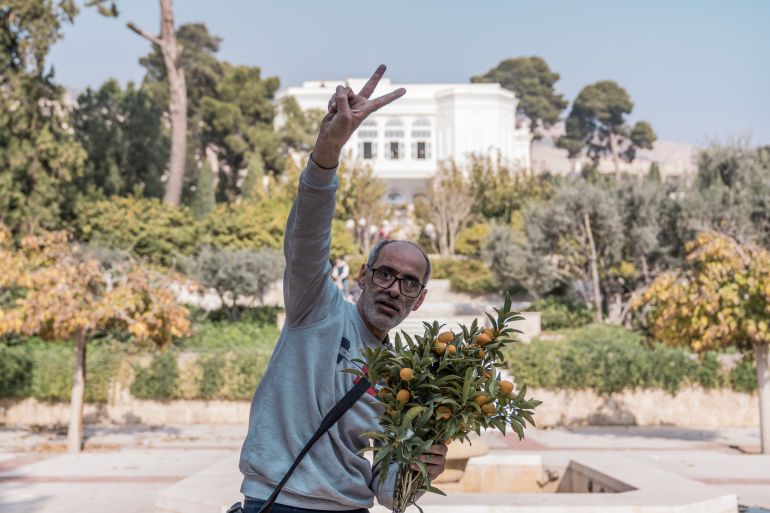Damascus’s joy and worry as people wonder: What happens after al-Assad?
People at Bashar al-Assad’s villa in the Syrian capital celebrate but also express concern over Hayat Tahrir al-Sham.
A man poses holding kumqauts in front of a villa formerly belonging to Bashar al-Assad [Raghed Waked/ Al Jazeera]By Justin SalhaniPublished On 11 Dec 202411 Dec 2024
Damascus, Syria – Outside a decadent villa in central Damascus, a man in a burgundy sweater and black track pants climbs onto a ledge and picks kumquats off a tree.
As he passes them down to others gathered there, someone yells: “May God never bless him!”
A harsh insult for the former resident of this property – who just fled the country – and one that, just two days earlier, no Syrian would have dreamed of even whispering!
Nor would Bashar al-Assad’s Presidential Guard, a special unit of the Syrian Army designated to protect the leader and his palaces, allow access to such a property.
While this is not one of al-Assad’s many palaces, locals gathered around it on Monday say this villa was one of many properties the family used for receiving guests around the country.
But today, one day after the 53-year dynastic rule of the family ended when al-Assad fled to Moscow in the early hours of December 8, there is no one left to stop the Syrian people from entering the premises.
The entryway to a former property of Bashar al-Assad in Damascus [Raghed Waked/Al Jazeera]
Inside the villa, the marble floors are covered with dirt and mud from people had tracked into the previously forbidden property.
Advertisement
Bakri al-Sahraa stands with his family by an upstairs entryway connected to an outdoor staircase that leads to the front garden. He watches people taking photos of the ornate chandelier – one of the few items the Syrian visitors had not reclaimed.
Standing here, he says, makes him realise how disconnected the Assads were from reality.
“The excessive luxury and these people living as rich people have no awareness of the poor,” the 58-year-old engineer says.
“In every city, he had a palace. In Homs there is one, in Aleppo there is one. What is this megalomania worth?”
In 2011, Syrians rose against the regime to demand their rights. The al-Assad regime responded with brutal repression. Rebel groups formed and took up arms against the state, resulting in a devastating civil war.
The effect has been more than half of Syrians falling into abject poverty with no food security, according to the Syrian Center for Policy Research (SCPR), an independent think tank.
Presidential letterhead at for al-Assad residence in Damascus [Raghed Waked/Al Jazeera]
Standing next to al-Sahraa is Shadi Sasli, a 42-year-old, also from Damascus.
“If you go to the Syrian Presidential Palace you see how they stole from the people,” Sasli says wonderingly. In Arabic, the palace is called Qasr Ash-shab, meaning the People’s Palace.
“There are Ferraris in his garage,” Sasli, who’s a car mechanic, says. “I used to see Ferraris only in my dreams.”
When asked about how the middle-aged men had lived the bulk of their lives under the house of al-Assad, Kassab al-Bahri, a 54-year-old from Damascus, joins in.
Advertisement
“We didn’t live under him,” he says. “We were dying under him.”
All three of the men are relieved after the fall of al-Assad. Today was a day of celebration.
But some concerns still linger among the people of Damascus.
Many speak about al-Assad’s fall as something necessary and cherished. But they also wondered what would replace him.
“There was a lot of fear, tension and doubt,” Shizaa, a woman wearing a white veil and standing outside the villa, tells Al Jazeera about the first moments when fighters entered Damascus.
A gunman in Umayyad Square in Damascus celebrates the fall of Assad [Raghed Waked / Al Jazeera]
Fear slowly subsided, she says, in the last couple of days, but concerns remain about what the future would look like under a new government.
“We just hope there is security,” Shizaa says, standing next to three other women.
Hayat Tahrir al-Sham (HTS) – the main fighting group in the assault that unseated al-Assad – has fighters all around Damascus and has set up checkpoints throughout the city.
Many also took to Umayyad Square in central Damascus to celebrate by firing their guns in the air and taking selfies with Syrians who had come from all over the country.
“We came here to celebrate because the tyrant of Damascus is gone,” a man from Eastern Ghouta says as celebratory gunfire rang out behind him and cars passed by blasting songs thanking God.
“The joy is great and people cannot hide their emotions because we were all living under oppression.”
Back in front of al-Assad’s villa, another man, this one wearing a leather jacket, picks kumquats and exuberantly sucks the juice from them, before projecting his voice for all around to hear: “How sweet this is!”
Advertisement
